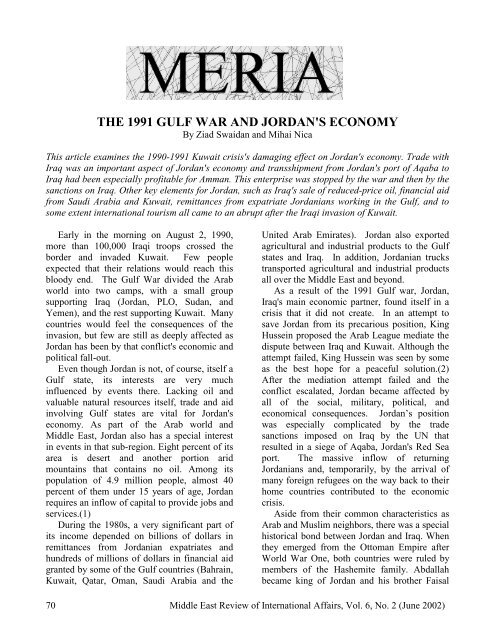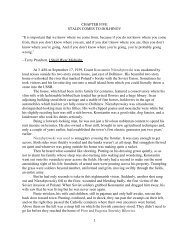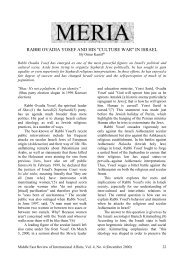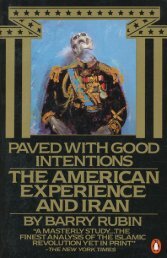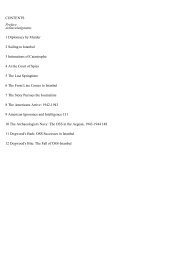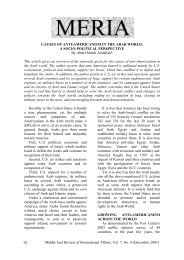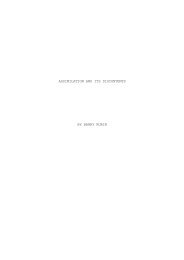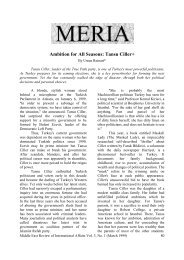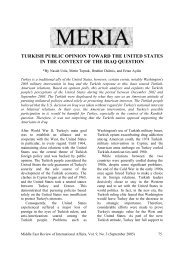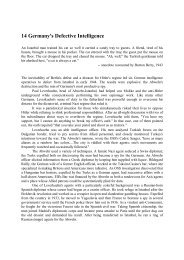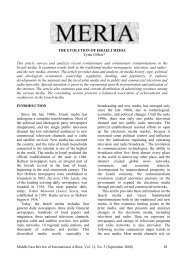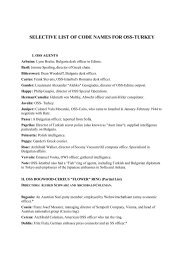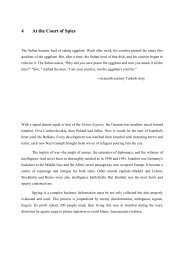on the jordanian economy - GLORIA Center
on the jordanian economy - GLORIA Center
on the jordanian economy - GLORIA Center
Create successful ePaper yourself
Turn your PDF publications into a flip-book with our unique Google optimized e-Paper software.
THE 1991 GULF WAR AND JORDAN'S ECONOMYBy Ziad Swaidan and Mihai NicaThis article examines <strong>the</strong> 1990-1991 Kuwait crisis's damaging effect <strong>on</strong> Jordan's ec<strong>on</strong>omy. Trade withIraq was an important aspect of Jordan's ec<strong>on</strong>omy and transshipment from Jordan's port of Aqaba toIraq had been especially profitable for Amman. This enterprise was stopped by <strong>the</strong> war and <strong>the</strong>n by <strong>the</strong>sancti<strong>on</strong>s <strong>on</strong> Iraq. O<strong>the</strong>r key elements for Jordan, such as Iraq's sale of reduced-price oil, financial aidfrom Saudi Arabia and Kuwait, remittances from expatriate Jordanians working in <strong>the</strong> Gulf, and tosome extent internati<strong>on</strong>al tourism all came to an abrupt after <strong>the</strong> Iraqi invasi<strong>on</strong> of Kuwait.Early in <strong>the</strong> morning <strong>on</strong> August 2, 1990,more than 100,000 Iraqi troops crossed <strong>the</strong>border and invaded Kuwait. Few peopleexpected that <strong>the</strong>ir relati<strong>on</strong>s would reach thisbloody end. The Gulf War divided <strong>the</strong> Arabworld into two camps, with a small groupsupporting Iraq (Jordan, PLO, Sudan, andYemen), and <strong>the</strong> rest supporting Kuwait. Manycountries would feel <strong>the</strong> c<strong>on</strong>sequences of <strong>the</strong>invasi<strong>on</strong>, but few are still as deeply affected asJordan has been by that c<strong>on</strong>flict's ec<strong>on</strong>omic andpolitical fall-out.Even though Jordan is not, of course, itself aGulf state, its interests are very muchinfluenced by events <strong>the</strong>re. Lacking oil andvaluable natural resources itself, trade and aidinvolving Gulf states are vital for Jordan'sec<strong>on</strong>omy. As part of <strong>the</strong> Arab world andMiddle East, Jordan also has a special interestin events in that sub-regi<strong>on</strong>. Eight percent of itsarea is desert and ano<strong>the</strong>r porti<strong>on</strong> aridmountains that c<strong>on</strong>tains no oil. Am<strong>on</strong>g itspopulati<strong>on</strong> of 4.9 milli<strong>on</strong> people, almost 40percent of <strong>the</strong>m under 15 years of age, Jordanrequires an inflow of capital to provide jobs andservices.(1)During <strong>the</strong> 1980s, a very significant part ofits income depended <strong>on</strong> billi<strong>on</strong>s of dollars inremittances from Jordanian expatriates andhundreds of milli<strong>on</strong>s of dollars in financial aidgranted by some of <strong>the</strong> Gulf countries (Bahrain,Kuwait, Qatar, Oman, Saudi Arabia and <strong>the</strong>United Arab Emirates). Jordan also exportedagricultural and industrial products to <strong>the</strong> Gulfstates and Iraq. In additi<strong>on</strong>, Jordanian truckstransported agricultural and industrial productsall over <strong>the</strong> Middle East and bey<strong>on</strong>d.As a result of <strong>the</strong> 1991 Gulf war, Jordan,Iraq's main ec<strong>on</strong>omic partner, found itself in acrisis that it did not create. In an attempt tosave Jordan from its precarious positi<strong>on</strong>, KingHussein proposed <strong>the</strong> Arab League mediate <strong>the</strong>dispute between Iraq and Kuwait. Although <strong>the</strong>attempt failed, King Hussein was seen by someas <strong>the</strong> best hope for a peaceful soluti<strong>on</strong>.(2)After <strong>the</strong> mediati<strong>on</strong> attempt failed and <strong>the</strong>c<strong>on</strong>flict escalated, Jordan became affected byall of <strong>the</strong> social, military, political, andec<strong>on</strong>omical c<strong>on</strong>sequences. Jordan’s positi<strong>on</strong>was especially complicated by <strong>the</strong> tradesancti<strong>on</strong>s imposed <strong>on</strong> Iraq by <strong>the</strong> UN thatresulted in a siege of Aqaba, Jordan's Red Seaport. The massive inflow of returningJordanians and, temporarily, by <strong>the</strong> arrival ofmany foreign refugees <strong>on</strong> <strong>the</strong> way back to <strong>the</strong>irhome countries c<strong>on</strong>tributed to <strong>the</strong> ec<strong>on</strong>omiccrisis.Aside from <strong>the</strong>ir comm<strong>on</strong> characteristics asArab and Muslim neighbors, <strong>the</strong>re was a specialhistorical b<strong>on</strong>d between Jordan and Iraq. When<strong>the</strong>y emerged from <strong>the</strong> Ottoman Empire afterWorld War One, both countries were ruled bymembers of <strong>the</strong> Hashemite family. Abdallahbecame king of Jordan and his bro<strong>the</strong>r Faisal70 Middle East Review of Internati<strong>on</strong>al Affairs, Vol. 6, No. 2 (June 2002)
The Triumph of <strong>the</strong> Old Middle Eastbecame king of Iraq. In Iraq, a 1958 militarycoup overthrew that regime and created arepublic. Still, relati<strong>on</strong>s eventually recovered.During <strong>the</strong> 1980-1988 Iran-Iraq war, Jordanand its people genuinely supported Iraq both asa fellow Arab state and as a protector againstIran's brand of radical Islamism, giving <strong>the</strong>relati<strong>on</strong>ship an increasingly important strategicdimensi<strong>on</strong>. When Jordan faced a deepec<strong>on</strong>omic crisis in 1989, its Gulf friends refusedto help, fur<strong>the</strong>r increasing Baghdad's relativeimportance for Amman..The ec<strong>on</strong>omic aspect of relati<strong>on</strong>s was quitecritical in all <strong>the</strong>se years. During <strong>the</strong> war withIran, Jordan's ec<strong>on</strong>omy--includingtransportati<strong>on</strong>, trade, agriculture, and industry--all became essential for Iraq. In exchange, Iraqsupplied Jordan with cheap oil, grants, and lowinterestloans. Today, Iraq remains <strong>the</strong> majorsupplier of discounted oil and Iraqi c<strong>on</strong>tinues tobe <strong>the</strong> largest market for Jordanian products.Delivering <strong>the</strong>se goods in both directi<strong>on</strong>s hasbecome <strong>on</strong>e of <strong>the</strong> main pillars of Jordan'stransportati<strong>on</strong> sector.Jordan's ec<strong>on</strong>omy faced many problemsbefore <strong>the</strong> Gulf War. There was a highunemployment rate of 20 percent. The foreigndebt, exceeding $11 billi<strong>on</strong>, was triple <strong>the</strong>annual Gross Domestic Product (GDP). And<strong>the</strong> level of financial transfers from Jordaniansworking in <strong>the</strong> Gulf was declining.(3). As aresult, Jordan had to devalue its currency by 50percent in 1989. Ano<strong>the</strong>r factor was Jordan’ssensitivity to trade levels and its dependence <strong>on</strong>internati<strong>on</strong>al commerce. For instance, exportswere worth almost $1 billi<strong>on</strong> in 1989, with afur<strong>the</strong>r $181 milli<strong>on</strong> in goods being re-exportedthrough Jordan. C<strong>on</strong>sidering that Jordan’s GDPwas a mere $4.3 billi<strong>on</strong>, this is a staggeringfigure. No less important to Jordanian livingstandards, <strong>the</strong> country imported $2.16 billi<strong>on</strong>worth of goods in that same year.(4)Before <strong>the</strong> Gulf war, well over half ofJordan’s exports were sent to Gulf states. Iraqal<strong>on</strong>e was <strong>the</strong> market for 23 percent of itsexports; Saudi Arabia was generally <strong>the</strong> marketfor at least 10 percent more. Iraq’s importancewas underlined by <strong>the</strong> fact that it was <strong>the</strong> sourceof between 10 and 17 percent of total Jordanianimports by <strong>the</strong> late 1980s.(5)Largely as a reacti<strong>on</strong> to <strong>the</strong> problems ofdeficit and debt described above, <strong>the</strong>Internati<strong>on</strong>al M<strong>on</strong>etary Fund (IMF) pushedJordan to apply a tough ec<strong>on</strong>omic reformprogram to increase producti<strong>on</strong>, decreaseimports, reduce government spending, and stopgovernment subsidies. These steps led tomassive riots in April 1989 starting in Ma'an,capital of Jordan's transport sector, and sweptthroughout <strong>the</strong> country, forcing King Husseinto change <strong>the</strong> government and keep subsidiesfor most basic products. By 1990, Jordan'sec<strong>on</strong>omy had begun recovering from <strong>the</strong> 1989crisis but still needed serious domestic effort,internati<strong>on</strong>al support, and time to reach betterlevels of performance.(6)THE IMPACT OF THE GULF WARImmediately after <strong>the</strong> Iraqi invasi<strong>on</strong> ofKuwait, <strong>the</strong> UN Security Council passedResoluti<strong>on</strong> 661 which invoked ec<strong>on</strong>omic tradesancti<strong>on</strong>s against Iraq, a decisi<strong>on</strong> with whichJordan complied. UN sancti<strong>on</strong>s deeply affectedJordan’s interests and ec<strong>on</strong>omy since, as statedabove, Iraq was <strong>the</strong> largest Jordanian tradepartner for <strong>the</strong> previous ten years.Many Jordanian companies lost largeamounts because Iraqi companies were unableto repay <strong>the</strong>ir debts due to <strong>the</strong> sancti<strong>on</strong>s.Moreover, key Jordanian ec<strong>on</strong>omic sectors suchas transportati<strong>on</strong>, agriculture, and industry,mainly serving Iraq, were severely affected by<strong>the</strong> UN resoluti<strong>on</strong>. The Amman Chamber ofCommerce announced in November 1990 that<strong>the</strong> trade sancti<strong>on</strong>s had already cost Jordan $2billi<strong>on</strong>, and <strong>the</strong> loss was growing. According to<strong>the</strong> same source, <strong>the</strong>y expected it to reach $3.6billi<strong>on</strong> in 1991.(7) In additi<strong>on</strong>, before <strong>the</strong>resoluti<strong>on</strong> Iraq was supplying 80 percent ofJordanian oil at reduced prices.(8) Thesancti<strong>on</strong>s forced Jordan to import oil from <strong>the</strong>internati<strong>on</strong>al markets at <strong>the</strong> going rates.Iraq was highly dependent <strong>on</strong> Jordan as <strong>the</strong>route for importing and exporting neededproducts. Each year, milli<strong>on</strong>s of t<strong>on</strong>s of goodswere handled for Iraq in <strong>the</strong> Jordanian port ofMiddle East Review of Internati<strong>on</strong>al Affairs, Vol. 6, No. 2 (June 2002) 71
Barry RubinAqaba and this aspect of Jordan’s ec<strong>on</strong>omy hadbeen growing rapidly before <strong>the</strong> sancti<strong>on</strong>s tookeffect. Imports via <strong>the</strong> port went from 6.2milli<strong>on</strong> t<strong>on</strong>s in 1989 to 3.2 milli<strong>on</strong> in 1990 to1.5 milli<strong>on</strong> in 1991. Exports also were hurt, ifless dramatically; from 10 milli<strong>on</strong> t<strong>on</strong>s in 1989to 8.9 milli<strong>on</strong> in 1990 to 7.7 milli<strong>on</strong> in 1991.(9)The trade sancti<strong>on</strong>s also caused <strong>the</strong>cancellati<strong>on</strong> of many shipping visits, and as adirect result, <strong>the</strong> number of ships arriving atAqaba decreased from 2,583 in 1988 to 2,075in 1991. This, in turn, made it harder and l<strong>on</strong>gerfor Jordan to receive products it needed forlocal industry and agriculture, in additi<strong>on</strong> todisrupting Jordanian exports. Allied warshipssearched thousands of vessels each year andturned back many shipments bel<strong>on</strong>ging toJordanian merchants who had business relati<strong>on</strong>swith Iraq, even if <strong>the</strong>y were targeted for localc<strong>on</strong>sumpti<strong>on</strong>. Jordanian phosphate andpotassium exports were also disrupted since<strong>the</strong>y depended <strong>on</strong> Aqaba’s port.(10)The Gulf War affected (in various ways)forty countries around <strong>the</strong> world.(11) Somecountries lost <strong>the</strong>ir exports to <strong>the</strong> Gulf area.O<strong>the</strong>rs lost <strong>the</strong> remittances of <strong>the</strong>ir expatriates.A few had to accommodate thousands of <strong>the</strong>ircitizens who returned from <strong>the</strong> Gulf area. Mostcountries were affected as a result of <strong>the</strong>interest rate increase <strong>on</strong> <strong>the</strong>ir old debts anddifficulty to get new credits. Many wereaffected by <strong>the</strong> increase in oil prices. Jordan,however, was severely affected by all of <strong>the</strong>seissues.Crown Prince Hassan announced that <strong>the</strong>effects of Gulf War <strong>on</strong> Jordan could besummarized in three dimensi<strong>on</strong>s: <strong>the</strong> tradesancti<strong>on</strong>s against Iraq, <strong>the</strong> refugees who fled <strong>the</strong>Gulf area and passed through Jordan, and <strong>the</strong>Jordanian expatriates who returned toJordan.(12) At <strong>the</strong> time of <strong>the</strong> crisis, estimates<strong>on</strong> what losses would occur due to <strong>the</strong> c<strong>on</strong>flictvaried, but in Jordan, <strong>the</strong>y were believed to bemassive. Mudhar Badran, Jordan’s PrimeMinister at <strong>the</strong> time, estimated Jordan’s totalloss at $8 billi<strong>on</strong>, Badran added that whileJordan’s exports to o<strong>the</strong>r Arab countries were$485.7 milli<strong>on</strong> in 1989 and had increased by$42.8 milli<strong>on</strong> in <strong>the</strong> first half of 1990, <strong>the</strong>y hadsince decreased gradually after August 2, 1990reaching zero at <strong>the</strong> end of 1990 and <strong>the</strong> first 3m<strong>on</strong>ths of 1991.(13)The Jordanian daily al-Dustur reported thatJordan’s loss would reach $1.4 billi<strong>on</strong> in <strong>the</strong>last five m<strong>on</strong>ths of 1990, and would reach $8.4billi<strong>on</strong> in 1991, including both direct andindirect losses.(14) According to ano<strong>the</strong>rJordanian daily, Sawt al-Sha’b, <strong>the</strong> UN hadestimated that Jordan lost $1.52 billi<strong>on</strong> in 1990,and expected it to lose ano<strong>the</strong>r $3.4 billi<strong>on</strong> in1991 (15). Sawt al-Sha'b’s Sameh Hanandehreported in November 1991 that Jordan had lost$1.68 billi<strong>on</strong> in 1990 and would lose $3.97billi<strong>on</strong> in 1991.(16)Regardless of how much <strong>the</strong>se figures(especially Badran’s) were an attempt to getmore foreign aid, <strong>the</strong> real impact was vast anddid cause Jordan’s leadership to worryenormously about <strong>the</strong> future of its ec<strong>on</strong>omy.Jordan’s GNP declined by more than 8 percent,and Jordan's general ec<strong>on</strong>omic growth droppedespecially in <strong>the</strong> first five m<strong>on</strong>ths after <strong>the</strong>war.(17) Jordanian reserves of foreigncurrencies and government revenues declinedleading to an estimated budget deficit of $308milli<strong>on</strong> in 1991, excluding interest payments.The crisis affected almost all producti<strong>on</strong>sectors, led to an increase in <strong>the</strong> unemploymentrate to nearly 30 percent, and also resulted in anincrease of <strong>the</strong> poverty rate to 33 percent.Moreover, Jordan had to postp<strong>on</strong>e <strong>the</strong>applicati<strong>on</strong> of <strong>the</strong> IMF reform program. Writingin al-Dustur, Odeh Suleiman al-Swaisc<strong>on</strong>cluded that, after <strong>the</strong> Iraqi and Kuwaitiec<strong>on</strong>omies, Jordan’s ec<strong>on</strong>omy suffered <strong>the</strong> mostdue to <strong>the</strong> Kuwait crisis.(18)Indeed, when compared to o<strong>the</strong>r countries,<strong>the</strong> serious effect <strong>on</strong> Jordan becomes evenclearer. During <strong>the</strong> eight m<strong>on</strong>ths after <strong>the</strong> GulfWar, Jordan lost an estimated $4 billi<strong>on</strong> whileTurkey, India and Yemen combined lost $5.5billi<strong>on</strong>. Turkey estimated its losses to be $3billi<strong>on</strong>, Yemen announced a loss of $830milli<strong>on</strong>, and India estimated its loss to about$1.6 billi<strong>on</strong>. Even Egypt's actual loss didn'texceed $1 billi<strong>on</strong> dollars. In additi<strong>on</strong>, while72Middle East Review of Internati<strong>on</strong>al Affairs, Vol. 6, No. 2 (June 2002)
The Triumph of <strong>the</strong> Old Middle Eastthose countries’ losses were less than Jordan’s,<strong>the</strong>y received more and better credits. Jordanobtained <strong>on</strong>ly $1 billi<strong>on</strong> dollars from Japan and<strong>the</strong> European Uni<strong>on</strong>.(19)Fur<strong>the</strong>rmore, before <strong>the</strong> crisis Arab andInternati<strong>on</strong>al financial support was vital forJordan's ec<strong>on</strong>omy. Before <strong>the</strong> Gulf War Jordanwas receiving almost $600 milli<strong>on</strong> a year from<strong>the</strong> wealthy Gulf States al<strong>on</strong>e. As a result of<strong>the</strong> Jordanian support of Iraq during <strong>the</strong> war,those countries cut off <strong>the</strong>ir support andEuropean and o<strong>the</strong>r countries such as <strong>the</strong> U.S.and Japan took <strong>the</strong> same steps (a situati<strong>on</strong> notreversed until Jordan became involved in <strong>the</strong>peace process with Israel, most especially after<strong>the</strong> Wye River Agreement). In additi<strong>on</strong>, Iraqand Kuwait <strong>the</strong>mselves had previously been <strong>the</strong>source of 30 percent of <strong>the</strong> total financial aidreceived by Jordan.(20)Jordanian exports to Arab and o<strong>the</strong>rcountries also declined. Kuwait and SaudiArabia prohibited <strong>the</strong> import of Jordanianproducts because of Jordan’s political positi<strong>on</strong>during <strong>the</strong> war. Jordanian agriculture, industryand trade sectors were thus shut out of <strong>the</strong> mostimportant Gulf markets. The transportati<strong>on</strong>sector was paralyzed as a result of <strong>the</strong> tradesancti<strong>on</strong>s and <strong>the</strong> decline in exports andimports.(21)Finally, <strong>the</strong> tourism sector was harshlyaffected by <strong>the</strong> Gulf War. Having taken nearlya decade to recover from <strong>the</strong> loss of <strong>the</strong>important tourist sites of Jerusalem andBethlehem in 1967, by 1990, <strong>the</strong> industry inJordan had reached all-time highs, with almost2.6 milli<strong>on</strong> tourists entering in that year al<strong>on</strong>e(most of whom were Arab). Utilizing its siteslike Jerash and Petra to <strong>the</strong>ir fullest, tourismhad even outperformed phosphates (Jordan’sleading export) in net receipts. However, by1991, this number dropped by almost 25percent to 2 milli<strong>on</strong> visitors.(22)RETURN OF JORDANIANSThere were many groups of people whopassed through or returned to Jordan due to <strong>the</strong>Gulf War. These people can be classified intofive categories: first, Jordanians who carryJordanian passports and have Jordan as <strong>the</strong>ir<strong>on</strong>ly home and who c<strong>on</strong>sequently returned toJordan. Sec<strong>on</strong>d, Jordan had to host Palestinianswho carried identificati<strong>on</strong> papers issued byo<strong>the</strong>r Arab countries that <strong>the</strong>n refused toreceive <strong>the</strong>m. Third, Palestinians from <strong>the</strong>West Bank, who had Jordanian passports, wereforced to stay for a l<strong>on</strong>g period in Jordan untilIsrael allowed <strong>the</strong>m to go back to <strong>the</strong> WestBank. Fourth, over 30,000 Iraqi refugees whoescaped Iraq eventually settled in Jordan.Finally, as many as <strong>on</strong>e milli<strong>on</strong> refugees during<strong>the</strong> last five of m<strong>on</strong>ths of 1990, according toPrime Minister Badran.(23)Jordan was <strong>on</strong>e of <strong>the</strong> largest providers ofwhite-collar employees to <strong>the</strong> Gulf countries.Jordanians living in <strong>the</strong> Gulf countries before<strong>the</strong> crisis exceeded <strong>on</strong>e milli<strong>on</strong> (20 percent ofJordan's total populati<strong>on</strong>) distributed am<strong>on</strong>gBahrain, Iraq, Kuwait, Oman, Qatar, SaudiArabia and United Arab Emirates. TheseJordanians living abroad also became <strong>the</strong> mainsupplier of foreign currency to Jordan, whichofficial statistics estimated at over $1.2 billi<strong>on</strong>annually in <strong>the</strong> mid-1980s (unofficial estimatesran as high as $3 billi<strong>on</strong>). Jordanians in Kuwaitand Iraq al<strong>on</strong>e accounted for almost 40 percentof <strong>the</strong> total Jordanian expatriate transfers, as<strong>the</strong>se two countries hosted over half a milli<strong>on</strong>Jordanians.However, as a result of <strong>the</strong> war, <strong>the</strong>seremittances decreased to $460 milli<strong>on</strong> (<strong>the</strong>official statistic) in 1991. It was estimated thatJordan had lost $122 milli<strong>on</strong> in 1990 and $318milli<strong>on</strong> in 1991 due to <strong>the</strong> decrease in <strong>the</strong>employee transfers.(24) In additi<strong>on</strong>, it wasestimated that Jordanian expatriates lost $1.4billi<strong>on</strong> of <strong>the</strong>ir deposits in Kuwait and $1.5billi<strong>on</strong> of <strong>the</strong>ir bel<strong>on</strong>gings. Making mattersworse, after <strong>the</strong> Gulf War, former Jordaniansworking outside Jordan, previously a source ofnati<strong>on</strong>al income, suddenly became a majorburden inside Jordan.Jordanians started to migrate to Kuwait in<strong>the</strong> 1950s, and <strong>the</strong> total number of Jordaniansworking in Kuwait before <strong>the</strong> Iraqi invasi<strong>on</strong>was almost 400,000. Jordanian labor helped inbuilding modern Kuwait, with JordanianMiddle East Review of Internati<strong>on</strong>al Affairs, Vol. 6, No. 2 (June 2002) 73
Barry Rubinemployees working in many governmentdepartments such as educati<strong>on</strong>, health care,military, as well as in <strong>the</strong> private sector. TheJordanian media reported that Jordanians weretreated as sec<strong>on</strong>d-class citizens, even thoughmost of <strong>the</strong>m had lived many years <strong>the</strong>re andmany were even born and raised in Kuwait.Before <strong>the</strong> Iraqi invasi<strong>on</strong> many articlesrequesting <strong>the</strong> government to deport Jordaniansappeared in Kuwaiti newspapers, and <strong>the</strong>slogan "Kuwait is for Kuwaitis" becamewidespread. Jordanians were unable to buyprivate houses or operate <strong>the</strong>ir own businessesin Kuwait. Following <strong>the</strong> liberati<strong>on</strong>, Kuwaitstarted a comprehensive campaign to deportJordanians out of Kuwait and an estimated330,000 Jordanians returned to Jordan after <strong>the</strong>Iraqi troops were expelled from Kuwait by <strong>the</strong>US-led UN coaliti<strong>on</strong>.(25) Many o<strong>the</strong>rJordanians, under indirect pressure andchanging ec<strong>on</strong>omic c<strong>on</strong>diti<strong>on</strong>s, returned fromo<strong>the</strong>r Gulf countries such as Bahrain, Oman,Qatar, Saudi Arabia, and United Arab Emirates.The return of 330,000 Jordanians from <strong>the</strong>Gulf area, in additi<strong>on</strong> to <strong>on</strong>e milli<strong>on</strong> refugeeswho passed through Jordan, had many seriousnegative effects <strong>on</strong> Jordan. Jordanianunemployment rate soared from 20 percent to30 percent.(26) White-collar employees were<strong>the</strong> main victims since Jordan was <strong>on</strong>e of <strong>the</strong>major exporters of white-collar employees to<strong>the</strong> Gulf area. The situati<strong>on</strong> worsened after <strong>the</strong>return of Jordanians from Kuwait and Iraq, asituati<strong>on</strong> which c<strong>on</strong>tinued until Jordan createdmore jobs and found vacancies abroad for <strong>the</strong>large number of unemployed.Returnees increased <strong>the</strong> pressure <strong>on</strong> <strong>the</strong>limited natural resources (e.g., water and food)and <strong>on</strong> <strong>the</strong> Jordanian public utilities (e.g.,educati<strong>on</strong> facilities, housing, and health careunits). The return of <strong>the</strong> large number ofJordanians in a short period increased <strong>the</strong>number of Jordanians who lived under <strong>the</strong>poverty level up to <strong>on</strong>e-third of <strong>the</strong> populati<strong>on</strong>.Before <strong>the</strong> Gulf crisis <strong>the</strong> total number ofJordanians who were living under poverty was600,000--almost 20 percent of <strong>the</strong> populati<strong>on</strong>.A study of 500 Jordanian families revealed thatJordan stepped down from a middle-incomecountry to a low-income country.(27)Salamah Hammad, writing in Sawt al-Sha'b,reported that over 1,625,000 pers<strong>on</strong>s hadentered Jordan between August and December1990, out of whom 885,000 c<strong>on</strong>tinued <strong>the</strong>ir tripto <strong>the</strong>ir home countries (e.g., India, Pakistan,Philippines, Thailand, and Egypt). Thisnumber equals 23 percent of Jordan’spopulati<strong>on</strong> and would be equivalent to 13milli<strong>on</strong> people passing through England. Inorder to help <strong>the</strong>se refugees, <strong>the</strong> JordanianGovernment spent over $60 milli<strong>on</strong> of itsbudget, though <strong>the</strong> UN eventually reimbursed<strong>on</strong>ly $12 milli<strong>on</strong> of that amount. Thousands ofPalestinians also stayed in Jordan because <strong>the</strong>o<strong>the</strong>r Arab countries that issued <strong>the</strong>ir papersrefused to receive <strong>the</strong>m. Additi<strong>on</strong>ally, manyo<strong>the</strong>r nati<strong>on</strong>alities like Somalis, Liberians, andEritreans stayed in Jordan for l<strong>on</strong>ger periodsuntil <strong>the</strong>y could find ano<strong>the</strong>r country that wouldaccept <strong>the</strong>m.(28)Jordanian authorities did not charge <strong>the</strong>refugees or internati<strong>on</strong>al airlines taking <strong>the</strong>refugees home any of <strong>the</strong> fees normally paid bytravelers. It also gave up <strong>the</strong> privileges of <strong>the</strong>nati<strong>on</strong>al Jordanian Airline Company (RoyalJordanian) and cancelled many of its flights toallow o<strong>the</strong>r airline companies to carry <strong>the</strong>refugees.(29)CONCLUSIONSThus, <strong>the</strong> damage of <strong>the</strong> Gulf War <strong>on</strong>Jordan’s ec<strong>on</strong>omy was multi-faceted andextensive. Jordan's ec<strong>on</strong>omy was highlydependent <strong>on</strong> o<strong>the</strong>r Arab countries in severalways, and especially <strong>on</strong> Iraq. Aside from itsheavy dependence <strong>on</strong> trade, Jordan also servedas a major thoroughfare for Iraqi imports andexports and had previously prospered <strong>on</strong> <strong>the</strong>transport of goods from <strong>the</strong> port of Aqaba toIraq. Jordan was also heavily dependent <strong>on</strong>Arab financial aid, subsidized Iraqi oil, andremittances from expatriate Jordanians workingin <strong>the</strong> Gulf, and to a lesser extent, <strong>on</strong>internati<strong>on</strong>al tourism—all of which came to anabrupt halt beginning with <strong>the</strong> Iraqi invasi<strong>on</strong> ofKuwait.74Middle East Review of Internati<strong>on</strong>al Affairs, Vol. 6, No. 2 (June 2002)
The Triumph of <strong>the</strong> Old Middle EastIn additi<strong>on</strong>, <strong>the</strong> Gulf countries stoppedimporting Jordanian products because ofJordan’s political support for Iraq, and manyJordanian employees were forced to return toJordan from Kuwait and o<strong>the</strong>r Gulf countries.Dealing with hundreds of thousands ofreturning Jordanians became a major challengefor <strong>the</strong> ec<strong>on</strong>omy, which was fur<strong>the</strong>r burdenedby over a milli<strong>on</strong> refugees in transit.These difficulties still affect Jordan’sec<strong>on</strong>omy. Gradually, <strong>the</strong> Gulf countriesreopened <strong>the</strong>ir markets to Jordanian productsand <strong>the</strong>ir job markets to <strong>the</strong> Jordanianemployees. However, <strong>the</strong> UN-imposed tradesancti<strong>on</strong>s <strong>on</strong> Iraq still str<strong>on</strong>gly affect Jordan.The Gulf countries’ financial support neverreturned to <strong>the</strong> levels reached before <strong>the</strong> GulfWar and was never entirely replaced byWestern aid. Jordan still has str<strong>on</strong>g ec<strong>on</strong>omicrelati<strong>on</strong>s with Iraq, which supplies Jordan withoil at half <strong>the</strong> internati<strong>on</strong>al market price. Withthis in mind, it is clear that <strong>the</strong> already weakJordanian ec<strong>on</strong>omic situati<strong>on</strong> could becomeeven worse if <strong>the</strong> c<strong>on</strong>flict in <strong>the</strong> Gulf areaerupts again.*Ziad Swaidan is an Assistant Professor ofInternati<strong>on</strong>al Business and Mihai Nica is aPh.D. student in <strong>the</strong> Department ofManagement and Marketing at Jacks<strong>on</strong> StateUniversity.NOTES1. The World Factbook 2001, [Online],availableat:. See also World Bank (2001), “Jordan at aglance”, [Online], Available at:.2. Milt<strong>on</strong> Viorst, “War in <strong>the</strong> Gulf, 1990-91:The Iraq-Kuwait C<strong>on</strong>flict and Its Implicati<strong>on</strong>s,”Middle East Policy, Vol. V, No. 4, (January1998), pp. 196-8.3. Slam al-Shawa, "Jordan Ec<strong>on</strong>omy Loss fromThe Gulf War," Sawt al-Sha'b, Issue 2824,(February 26, 1991), p. 9.4. Ec<strong>on</strong>omist Intelligence Unit, Jordan CountryReport, 1992-3, pp.14, 30.5. Carolyn Faraj, "Gulf War Effects <strong>on</strong> JordanIndustry," al-Ra'i, Issue 7415, (November 15,1990), p. 4.and Ec<strong>on</strong>omist Intelligence Unit,Jordan Country Report, 1992-3, p. 30.6. "Gulf War Affected Forty Countries," al-Dustur, Issue 8489, (April 7, 1991), p. 9.7. Amman Chamber Of Commerce, "The GulfWar Effects <strong>on</strong> Jordan Ec<strong>on</strong>omy," al-Dustur,Issue 8356, (November 25, 1990), p. 1.8. Mufleh Akil, "Jordan Ec<strong>on</strong>omy after <strong>the</strong> GulfWar," al-Dustur, Issue 8507, (1991), p. 79. Ec<strong>on</strong>omist Intelligence Unit, Jordan CountryReport, 1992-3, p. 26. See also previousediti<strong>on</strong>s of <strong>the</strong> report.10. "By Increasing The C<strong>on</strong>trol On Its BordersWith Iraq, Jordan Avoided a Severe DisputeWith <strong>the</strong> U.S," al-Sharq al-Awsat, Issue 4983,(July 20, 1992) p. 10; and Ec<strong>on</strong>omistIntelligence Unit, Jordan Country Report,1992-3, p. 26. See also previous editi<strong>on</strong>s of <strong>the</strong>report.11. "Gulf War Affected Forty Countries," al-Dustur, Issue 8489, (April 7, 1991), p. 9.12. Prince al-Hassan Bin Talal, "Gulf WarImpact <strong>on</strong> Jordan Ec<strong>on</strong>omy," al-Dustur, Issue8349 (November 18, 1990), p. 1.13. Mudhar Badran, "Jordan Total Loss As aResult of Gulf War," al-Dustur, Issue 8448,(February 25, 1991), p. 1.14. Odeh Suleiman al-Swais, "The Gulf WarEffects On The Jordanian Per Capita," p. 10.See also Lima Nabil, “Number of JordaniansUnder Poverty Increased to One Milli<strong>on</strong>,” al-Ra’i, Issue 7450, (1991) p. 19.15. "Gulf War Effects <strong>on</strong> Jordan Ec<strong>on</strong>omy," al-Dustur, Issue 8775, (February 24, 1992), p. 2.16. Sameh Hanandeh, " Jordan Lost $3.97Billi<strong>on</strong> As A Result Of The Gulf War," Sawt al-Sha'b, Issue 3085, (November 20, 1991), p. 1.17. "Gulf War Effects <strong>on</strong> Jordan Nati<strong>on</strong>alProducti<strong>on</strong>," Sawt al-Sha'b, Issue 3021,(September 17, 1991), p. 8.18. Odeh Suleiman al-Swais, "The Gulf WarEffects On The Jordanian Per Capita," Al-Dustur, Issue 8369, (December 8, 1990), p. 10.19. "Gulf War Affected Forty Countries," al-Dustur, Issue 8489, (April 7, 1991), p. 9.20. Mufleh Akil, "Jordan Ec<strong>on</strong>omy after <strong>the</strong>Middle East Review of Internati<strong>on</strong>al Affairs, Vol. 6, No. 2 (June 2002) 75
Gulf War," al-Dustur, Issue 8507, (1991), p. 721. "Jordan Ec<strong>on</strong>omy Situati<strong>on</strong> During TheGulf War," Akhbar al-Esb'u, Issue 1496,(January 21, 1991), p. 4.22. Ec<strong>on</strong>omist Intelligence Unit, JordanCountry Report, 1992-3, p. 25. See alsoprevious editi<strong>on</strong>s of <strong>the</strong> report.23. Mudhar Badran, "Jordan Total Loss As aResult of Gulf War," al-Dustur, Issue 8448,(February 25, 1991), p. 1.24. Official statistics can be found at <strong>the</strong>Jordanian Central Bank25. “Refugees Crisis,” Sawt al-Sha’b, Issue3139, (December 13, 1992), p. 1.26. See for instance, "The JordanianUnemployed Increased to 128,000, 62 Percentof Them Did Not Work Since One Year Ago,”al-Sharq al-Awsat, Issue 4931, (May 29, 1992),p. 9. See also "Labor Distributi<strong>on</strong> Does not FitJordan's Local Needs," al-Sharq al-Awsat, Issue4992, (July 29, 1992), p. 9.27. Lima Nabil, “Number of Jordanians UnderPoverty Increased to One Milli<strong>on</strong>,” al-Ra’i,Issue 7450, (1991) p. 19.28. “Prince al-Hassan Discusses Methods toAbsorb Jordanian Returnees,” Sawt al-Sha’b,Issue 3109, (December 14, 1991), p. 1.“Refugees Crisis.” Sawt al-Sha’b, Issue 3139,December 13, 1992), p. 1. Hammad, Salamah.,"Jordan Helped <strong>the</strong> Refugees for HumanReas<strong>on</strong>s." Al-Dustur, Issue 8371, (December10, 1991), p. 4.29. “Refugees Crisis.” Sawt al-Sha’b, Issue3139, (December 13, 1992), p. 1.Barry Rubin76Middle East Review of Internati<strong>on</strong>al Affairs, Vol. 6, No. 2 (June 2002)


